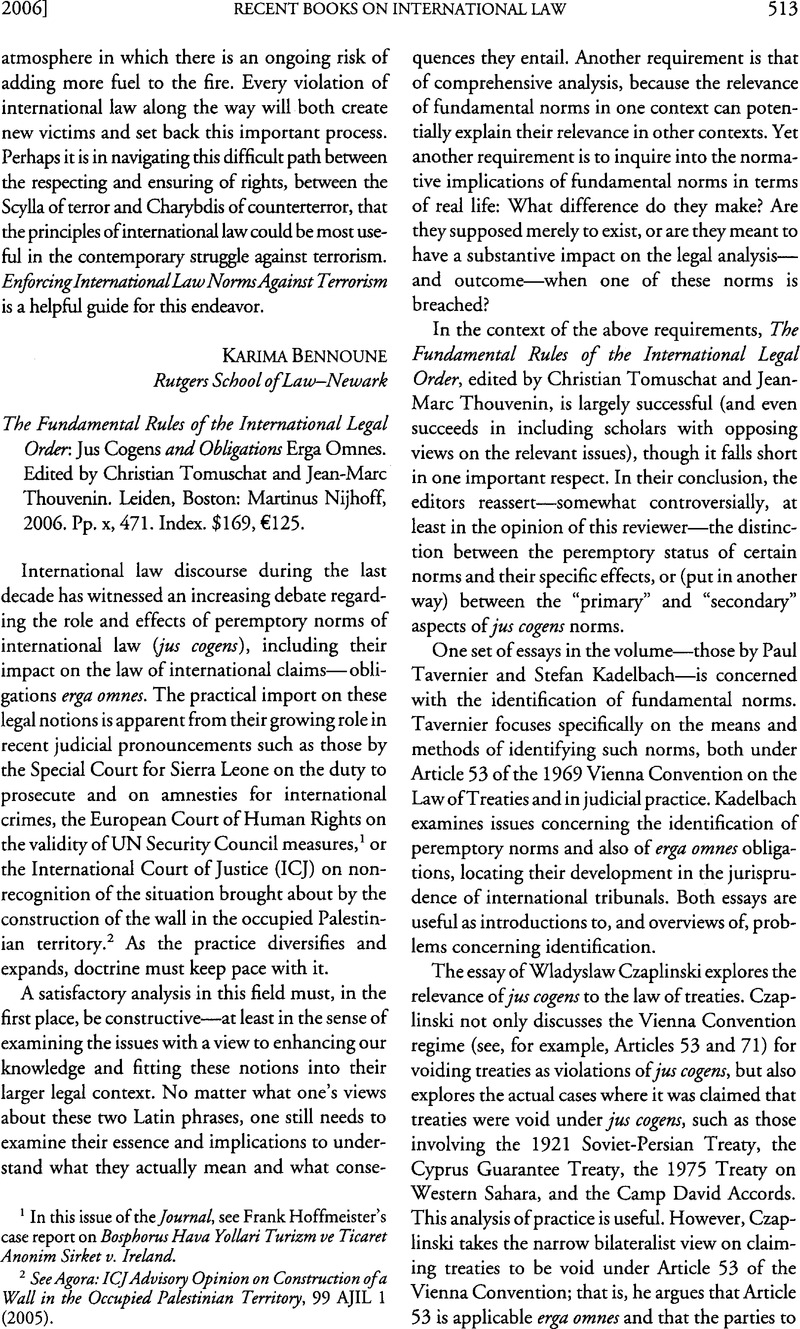Article contents
The Fundamental Rules of the International Legal Order: Jus Cogens and Obligations Erga Omnes. Edited by Christian Tomuschat and Jean-Marc Thouvenin. Leiden, Boston: Martinus Nijhoff, 2006. Pp. x, 471. Index. $169, €125.
Published online by Cambridge University Press: 27 February 2017
Abstract

- Type
- Recent Books on International Law
- Information
- Copyright
- Copyright © American Society of International Law 2006
References
1 In this issue of the Journal, see Frank Hoffmeister’s case report on Bosphorus Hava Yollari Turizm ve Ticaret Anonim Sirket v. Ireland.
2 See Agora: ICJ Advisory Opinion on Construction of a Wall in the Occupied Palestinian Territory, 99 AJIL 1 (2005)Google Scholar.
3 Prosecutor v. Furundzija, No. IT-95-17/1-T, paras. 155-56 (Dec. 10, 1998).
4 Regina v. Bartle, ex parte Pinochet, [1999] 2 All E.R. 97, [1999] 2 W.L.R. 827 (H.L.) (especially opinions by Browne-Wilkinson, L.J., and by Millet, L.J., dissenting); Nulyarimma v. Thompson (1999) 165 A.L.R. 621 (especially opinions by Whitlam, J., and Merkel, J.) (Austl.); Inter-Am. C.H.R., Annual Report, 1998, ch. VII, OEA/Ser.L/V/II.102, doc. 6 rev. (1999) (recommendation (no. 21) on universal jurisdiction and the international criminal court).
5 See, e.g., Hilao v. Estate of Marcos, 25 F.3d 1467, 1475 (9thCir. 1994);Trajanov. Marcos, 978 F.2d493, 500 (9th Cir. 1992); Xuncax v. Gramajo, 886 F.Supp 162, 184-89 (D. Mass. 1995).
6 Military and Paramilitary Activities in and Against Nicaragua (Nicar. v. U.S.), 1986 ICJ Rep. 14, paras. 187-91 (June 27).
7 In I Congreso, the House of Lords faced the plea that the State Immunity Act of 1978, which was not directly applicable because of its nonretroactivity, embodied applicable international law. Lord Wilberforce refused, stating that “to argue from the terms of a statute to establish what international law provides is to stand the accepted argument on its head,” adding that
if one State chooses to lay down by enactment certain limits, that is by itself no evidence that those limits are generally accepted by States. And particularly enacted limits may be (or presumed to be) not inconsistent with general international law— the latter being in a state of uncertainty—without affording evidence what that law is.
I Congreso del Partido, [1983] 1 AC. 244, 260 (H.L.).
8 See, e.g., Smith v. Socialist People’s Libyan Arab Jamahiriya, 101 F.3d 239 (2d Cir. 1996); Princz v. Federal Republic of Germany, 26 F.3d 1166 (D.C. Cir. 1994); Siderman de Blake v. Argentina, 965 F.2d 699, 714-18 (9th Cir. 1992).
9 Al-Adsani v. Kuwait, 107 ILR 536, 538-47 (CA. 1996); Al-Adsani v. Kuwait, 103 ILR 420, 427-31 (Q..B. 1995).
10 See supra note 7.
11 Trendtex Trading Corp. v. Central Bank of Nigeria, [1977] 1 Q.B. 529, 552-53 (C.A.).
12 See, in general, the ILC Articles on Responsibility of States for Internationally Wrongful Acts, in Report of the International Law Commission on the Work of Its Fifty-third Session, UN GAOR, 56th Sess., Supp. No. 10, at 43, UN Doc. A/56/10 (2001), available at <http://www.un.org/law/ilc>, especially Articles 26, 40-41, 45, 48, and 55, along with the commentaries thereto.
13 Jones v Saudi Arabia, [2004] EWCA (Civ) 1394; Reginav. Bartle, ex parte Pinochet, [1999] 2 All E.R. 97, [1999]2W.L.R. 827(H.L.).
- 1
- Cited by


